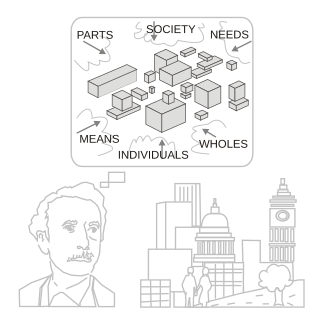Related Research Articles
Management science or Managerial Science (MS) is the broad interdisciplinary study of problem solving and decision making in human organizations, with strong links to management, economics, business, engineering, management consulting, and other fields. It uses various scientific research-based principles, strategies, and analytical methods including mathematical modeling, statistics and numerical algorithms to improve an organization's ability to enact rational and accurate management decisions by arriving at optimal or near optimal solutions to complex decision problems. Management science helps businesses to achieve goals using various scientific methods.
Systems theory is the interdisciplinary study of systems, i.e. cohesive groups of interrelated, interdependent components that can be natural or human-made. Every system has causal boundaries, is influenced by its context, defined by its structure, function and role, and expressed through its relations with other systems. A system is "more than the sum of its parts" by expressing synergy or emergent behavior.
An error is an action which is inaccurate or incorrect. In some usages, an error is synonymous with a mistake.

Teleology or finality is a reason or an explanation for something which serves as a function of its end, its purpose, or its goal, as opposed to something which serves as a function of its cause. A purpose that is imposed by a human use, such as the purpose of a fork to hold food, is called extrinsic.

Anthony Stafford Beer was a British theorist, consultant and professor at the Manchester Business School. He is best known for his work in the fields of operational research and management cybernetics.

Self-organization, also called spontaneous order in the social sciences, is a process where some form of overall order arises from local interactions between parts of an initially disordered system. The process can be spontaneous when sufficient energy is available, not needing control by any external agent. It is often triggered by seemingly random fluctuations, amplified by positive feedback. The resulting organization is wholly decentralized, distributed over all the components of the system. As such, the organization is typically robust and able to survive or self-repair substantial perturbation. Chaos theory discusses self-organization in terms of islands of predictability in a sea of chaotic unpredictability.
Meta-systems have several definitions. In general, they link the concepts "system" and "meta-". A "meta-system" is about other systems, such as describing, generalizing, modelling, or analyzing the other system(s).

Systems science, also referred to as systems research, or, simply, systems, is an interdisciplinary field concerned with understanding systems—from simple to complex—in nature, society, cognition, engineering, technology and science itself. The field is diverse, spanning the formal, natural, social, and applied sciences.
Second-order cybernetics, also known as the cybernetics of cybernetics, is the recursive application of cybernetics to itself and the reflexive practice of cybernetics according to such a critique. It is cybernetics where "the role of the observer is appreciated and acknowledged rather than disguised, as had become traditional in western science". Second-order cybernetics was developed between the late 1960s and mid 1970s by Heinz von Foerster and others, with key inspiration coming from Margaret Mead. Foerster referred to it as "the control of control and the communication of communication" and differentiated first order cybernetics as "the cybernetics of observed systems" and second-order cybernetics as "the cybernetics of observing systems". It is closely allied to radical constructivism, which was developed around the same time by Ernst von Glasersfeld. While it is sometimes considered a break from the earlier concerns of cybernetics, there is much continuity with previous work and it can be thought of as a distinct tradition within cybernetics, with origins in issues evident during the Macy conferences in which cybernetics was initially developed. Its concerns include autonomy, epistemology, ethics, language, self-consistency, self-referentiality, and self-organizing capabilities of complex systems. It has been characterised as cybernetics where "circularity is taken seriously".
The viable system model (VSM) is a model of the organizational structure of any autonomous system capable of producing itself. A viable system is any system organised in such a way as to meet the demands of surviving in the changing environment. One of the prime features of systems that survive is that they are adaptable. The VSM expresses a model for a viable system, which is an abstracted cybernetic description that is claimed to be applicable to any organisation that is a viable system and capable of autonomy.
In psychotherapy, systemic therapy seeks to address people not only on the individual level, as had been the focus of earlier forms of therapy, but also as people in relationships, dealing with the interactions of groups and their interactional patterns and dynamics.
Ranulph Glanville was an Anglo-Irish cybernetician and design theorist. He was a founding vice-president of the International Academy for Systems and Cybernetic Sciences (2006–2009) and president of the American Society for Cybernetics (2009–2014).

Enterprise modelling is the abstract representation, description and definition of the structure, processes, information and resources of an identifiable business, government body, or other large organization.
In cybernetics, the term variety denotes the total number of distinguishable elements of a set, most often the set of states, inputs, or outputs of a finite-state machine or transformation, or the binary logarithm of the same quantity. Variety is used in cybernetics as an information theory that is easily related to deterministic finite automata, and less formally as a conceptual tool for thinking about organization, regulation, and stability. It is an early theory of complexity in automata, complex systems, and operations research.
Management cybernetics is the application of cybernetics to management and organizations. "Management cybernetics" was first introduced by Stafford Beer in the late 1950s and introduces the various mechanisms of self-regulation applied by and to organizational settings, as seen through a cybernetics perspecive. Beer developed the theory through a combination of practical applications and a series of influential books. The practical applications involved steel production, publishing and operations research in a large variety of different industries. Some consider that the full flowering of management cybernetics is represented in Beer's books. However, learning continues.
Conversation theory is a cybernetic and dialectic framework that offers a scientific theory to explain how interactions lead to "construction of knowledge", or "knowing": wishing to preserve both the dynamic/kinetic quality, and the necessity for there to be a "knower" Following Dubberly and Pangaro, a conversation in the context of conversation theory can be thought of as "the means by which existing knowledge is conveyed and new knowledge is generated”. So how do organisms engage and learn? Through a self-reflective mental loop that works recursively. Described in a more processed approach: one would open a channel, commit to engage, construct meaning and in the end either evolve or converge. This is the basis for Conversation Theory. The theory was developed by Gordon Pask, who credits Bernard Scott, Dionysius Kallikourdis, Brian Lewis and others during its initial development and implementation as well as Paul Pangaro during subsequent years.

The American Society for Cybernetics (ASC) is an American non-profit scholastic organization for the advancement of cybernetics as a science, a discipline, a meta-discipline and the promotion of cybernetics as basis for an interdisciplinary discourse. The society does this by developing and applying cybernetics’ concepts which are presented and published via its conferences and peer-reviewed publications. As a meta-discipline, it creates bridges between disciplines, philosophies, sciences, and arts. The ASC is a full member of the International Federation for Systems Research (IFSR).

Cybernetics is a wide-ranging field concerned with regulatory and purposive systems. The core concept of cybernetics is circular causality or feedback—where the observed outcomes of actions are taken as inputs for further action in ways that support the pursuit and maintenance of particular conditions, or their disruption. Cybernetics is named after an example of circular causality, that of steering a ship, where the helmsperson maintains a steady course in a changing environment by adjusting their steering in continual response to the effect it is observed as having. Other examples of circular causal feedback include: technological devices such as thermostats ; biological examples such as the coordination of volitional movement through the nervous system; and processes of social interaction such as conversation. Cybernetics is concerned with feedback processes such as steering however they are embodied, including in ecological, technological, biological, cognitive, and social systems, and in the context of practical activities such as designing, learning, managing, conversation, and the practice of cybernetics itself. Cybernetics' transdisciplinary and "antidisciplinary" character has meant that it intersects with a number of other fields, leading to it having both wide influence and diverse interpretations.
The viable systems approach (VSA) is a systems theory in which the observed entities and their environment are interpreted through a systemic viewpoint, starting with the analysis of fundamental elements and finally considering more complex related systems. The assumption is that each entity/system is related to other systems, placed at higher level of observation, called supra-systems, whose traits can be detected in their own subsystems.
References
- 1 2 Beer, Stafford (2002-01-01). "What is cybernetics?". Kybernetes. 31 (2): 209–219. doi:10.1108/03684920210417283. ISSN 0368-492X.
- ↑ Komlos, David Benjamin and David (2021-09-13). "The Purpose Of A System Is What It Does, Not What It Claims To Do". Forbes. Archived from the original on 2021-09-13. Retrieved 2022-06-11.
- ↑ Systems biology : philosophical foundations. Fred C. Boogerd (1st ed.). Amsterdam: Elsevier. 2007. ISBN 978-0-444-52085-2. OCLC 162587033.
{{cite book}}: CS1 maint: others (link) - ↑ Ward, Aidan (2003). Trust and mistrust : radical risk strategies in business relationships. John Smith. Chichester, West Sussex: Wiley. ISBN 0-470-85318-2. OCLC 51966365.